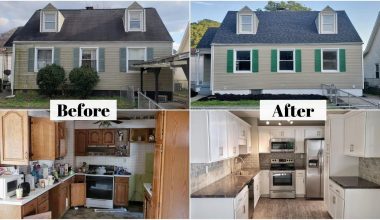When a homeowner fails to make mortgage payments and defaults on their loan, the bank initiates foreclosure proceedings to recover the outstanding debt. If the property does not sell at a foreclosure auction, it becomes an REO property. A bank-owned property, also known as a real estate-owned (REO) property, refers to a property that is owned by a bank or other financial institution. This type of property typically comes into the possession of the bank as a result of the foreclosure process. The best information about a bank-owned property is presented in this post.
What is a Bank Owned Property?
A bank-owned property, also known as a real estate-owned (REO) property, is a property that has been acquired by a bank or other financial institution through the foreclosure process. When a borrower fails to make mortgage payments, the lender can initiate foreclosure proceedings to recover the outstanding debt. If the property does not sell at a foreclosure auction, the ownership reverts to the lender. It becomes a bank-owned property. Once a property becomes bank-owned, the bank or financial institution takes possession and becomes responsible for the property’s maintenance and sale. These properties are typically sold in “as-is” condition, meaning the bank usually does not make any repairs or improvements.
Conditions of a Bank-Owned Property
The condition of bank-owned properties can vary, as they may have experienced neglect or damage during the foreclosure process.
- Banks generally aim to sell these properties as quickly as possible to recoup their losses. They may list the properties for sale through real estate agents or auction platforms. Buyers of bank-owned properties can sometimes get a discount compared to market prices. It depends on various factors such as the condition of the property and the local real estate market.
- Potential buyers need to conduct thorough due diligence when considering purchasing a bank-owned property. This may include inspections, title searches, and understanding any liens or outstanding debts associated with the property. Working with a real estate agent experienced in dealing with bank-owned properties can help navigate the process.
How to Buy a Bank-Owned Property
Buying a bank-owned property involves a specific process.
Here are the general steps on how to buy a bank-owned property:
- Research and locate bank-owned properties: Start by identifying the banks or financial institutions that sell REO properties in your desired location.
- Get pre-approved for financing: Pre-approval will help you determine your budget and demonstrate your seriousness as a buyer.
- Conduct thorough due diligence: This includes inspecting the property and reviewing any available property disclosures. It also involves obtaining a title search to ensure there are no liens or legal issues. Research the property’s history and any outstanding debts or obligations.
- Make an offer: If you are satisfied with the property after due diligence, you can make an offer to the bank.
- Negotiate and finalize the purchase: Be prepared to negotiate on price, terms, or other conditions. Once both parties agree on the terms.
- Arrange to finance or provide proof of funds: If you require financing, you’ll need to work with your lender to complete the loan application process and provide all necessary documentation.
- Close the transaction: The closing process involves completing all legal and financial obligations to transfer ownership of the property.
Where To Find Bank-Owned Property Listings
To find listings of bank-owned properties, you can try the following methods:
#1. Bank Websites
Many banks have dedicated sections on their websites where they list their available REO properties for sale. Visit the websites of major banks in your area and look for their real estate or REO departments.
#2 Real Estate Agent
Work with a real estate agent who specializes in bank-owned properties. They can provide you with information on available properties and guide you through the buying process.
#3. Online Listing Platforms
Several online platforms specialize in listing bank-owned properties. Some popular websites include RealtyTrac, Zillow’s foreclosure listings, and Auction.com. These platforms allow you to search for bank-owned properties based on location and other criteria.
#4. Local Newspapers and Classifieds
Check local newspapers, both print and online versions, as they sometimes publish foreclosure and bank-owned property listings. Classified ads may have information on bank-owned properties available for sale.
#5. Public Auctions
Banks sometimes sell their REO properties through public auctions.
How Much to Offer a Bank-Owned Property
Determining how much to offer on a bank-owned property requires careful consideration of various factors. The offer price will depend on the specific circumstances of the property, the local market, and your budget and preferences.
Key Points to Consider During an Offer
- Property condition: Assess the condition of the property. Consider any necessary repairs or renovations and factor them into your offer.
- Market value: Research the market value of similar properties in the area.
- Comparable sales: Look for recently sold properties that are similar in terms of location, size, condition, and amenities.
- Local market conditions: Consider the current state of the local real estate market.
- Offer strategy: Decide on your offer strategy. You may choose to make an initial offer below the asking price and negotiate with the bank.
- Financing and contingencies: Consider any financing options or contingencies you may include in your offer.
Bank Owned Property NJ
Bank-owned properties, also known as real estate-owned (REO) properties, are properties that have been repossessed by a bank or financial institution due to the owner’s failure to make mortgage payments. In New Jersey, bank-owned properties are fairly common, especially during times of economic downturns or foreclosures.
When a homeowner defaults on their mortgage payments in New Jersey, the bank can initiate foreclosure proceedings to regain possession of the property. If the foreclosure process is successful, the property becomes the bank’s asset. The bank then lists the property for sale to recoup the unpaid mortgage balance. Bank-owned properties in New Jersey can come in various forms, such as single-family homes, townhouses, condominiums, or even commercial properties
Significant Conditions in Acquiring BOP in NJ
These properties may be in various conditions, ranging from well-maintained to requiring significant repairs or renovation. Acquiring a bank-owned property in New Jersey requires following a specific process.
- The bank typically hires a real estate agent to handle the sale and market of the property. Interested buyers can search for bank-owned properties through various platforms, including real estate websites, foreclosure listings, or directly contacting local real estate agents.
- Buyers interested in purchasing a bank-owned property in New Jersey should be prepared for some unique considerations. These properties are typically sold “as-is,” meaning the bank will not make any repairs or provide any warranties. Buyers need to conduct thorough inspections and due diligence before making an offer.
- Financing options for bank-owned properties in New Jersey are similar to other real estate purchases. Buyers may choose to pay cash or obtain financing through a mortgage lender. It’s recommended to get pre-approved for a mortgage before making an offer, as it can strengthen the buyer’s position.
- While bank-owned properties can potentially offer attractive prices. It’s important to be aware of the potential risks and challenges involved. These properties may have liens or other legal complications that need to be addressed. The purchase process for bank-owned properties can sometimes be more complex and time-consuming compared to traditional sales.
What is Another Term for Bank Owned Property?
Another term for a bank-owned property is real estate-owned (REO) property.
Why Do Banks Own Property?
Banks may own property for various reasons, such as:
- Obtained through foreclosure: Banks may acquire properties through foreclosure when the borrower defaults on a mortgage loan.
- Used as collateral: Banks may hold properties as collateral for loans, such as when a borrower offers commercial property as collateral for a business loan.
- Investment purposes: Banks may purchase properties as part of their investment portfolio, especially if they believe that there is potential for appreciation in the value of the property.
- Owning properties is not the core business of banks, so they aim to dispose of these assets promptly. Selling bank-owned properties allows banks to recoup their investment, clear their balance sheets, and focus on their primary banking activities.
What Do Banks Do With Property?
When banks acquire properties through foreclosure or other means, they aim to sell them as quickly as possible. The primary goal is to recoup the outstanding debt and minimize losses.
Here are some common steps banks take with the properties they own:
- Property Maintenance: Banks are responsible for maintaining the properties they own.
- Listing the Property: Banks list the properties for sale on various channels, such as their websites, real estate agents, and online platforms specializing in bank-owned properties.
- Marketing and Selling: Banks employ marketing strategies to attract potential buyers.
- Price Determination: Banks price their properties based on market value.
- Negotiations and Offers: Interested buyers can make offers on bank-owned properties.
- Closing the Sale: Once the bank accepts an offer, the sale proceeds to the closing stage.
What is it Called When a Bank Takes Over Property from a Borrower?
When a bank takes over ownership of a property from a borrower who has defaulted on their mortgage, it is referred to as foreclosure. Foreclosure is a legal process by which a lender, such as a bank or financial institution, seizes and gains ownership of a property to recover the outstanding loan balance.
What is the Legal Term for the Ownership of a Property?
The legal term for ownership of a property is “title.” The title refers to the legal rights and ownership interest that a person or entity has in a property. It signifies that the owner has legal control, possession, and the right to use the property within the boundaries of the law.
When a person owns the title to a property, they have certain rights, such as the right to sell, lease, or mortgage the property. The title also provides protection against others claiming ownership of the property.
Title ownership is established and documented through a variety of legal instruments, such as deeds, contracts, and other property records. These documents serve as evidence of ownership and are typically recorded with the appropriate government authority, such as the county recorder’s office.
What is Ownership in Banking?
In banking, ownership refers to the legal rights and control that an individual or entity has over certain assets or financial instruments held with a bank. It represents the possession and control of the assets and the corresponding rights associated with them.
Ownership in banking can also extend to other financial instruments such as stocks, bonds, mutual funds, or certificates of deposit (CDs) that are held within a bank’s custody or offered by the bank itself. In these cases, the bank acts as a custodian, safeguarding the assets and facilitating transactions on behalf of the owner.
Ownership in banking involves the rights to access, withdraw, transfer, or use the funds or financial instruments according to the terms and conditions agreed upon between the account holder and the bank. The owner has the authority to manage their funds and make decisions regarding their use or investment.
What is a Bank House?
The term bank house can have different meanings depending on the context. Here are a few possible interpretations:
- A bank-owned property: A bank house can refer to a property that is owned by a bank, and may have been acquired through foreclosure or other means.
- A banking institution: Bank house can also be used as a synonym for banking house which is a more formal term for a bank or financial institution.
A historic building: Bank house can refer to a historic building or landmark that was once used as a bank.
Conclusion
Once the bank assumes ownership of the property, it will usually try to sell it to recoup the outstanding loan amount. Bank-owned properties are sold “as-is,” meaning they are sold in their current condition without any repairs or warranties. Buyers interested in purchasing a bank-owned property can often find them listed on the bank’s website, through real estate agents, or at public auctions.
Bank-owned properties can offer potential opportunities for buyers, as they are often priced below market value to attract buyers quickly. They may also come with certain risks and challenges. These properties may require repairs or renovations, and the buyer may be responsible for addressing any outstanding liens or unpaid taxes associated with the property. Buyers need to conduct thorough due diligence and seek professional advice when considering the purchase of a bank-owned property.
Related Articles
- BEST BANKS IN THE WORLD: Top Largest, Most Popular & Worst Banks in 2023
- BUSINESS BANK LOANS: Best Banks for Business Loans in 2023
- HOW TO SWITCH BANKS: Step-By-Step Guide
- REAL ESTATE INVESTMENT BANKING: What It Is, Requirements & Salary
- MECHANIC BANK: All You Should Know






